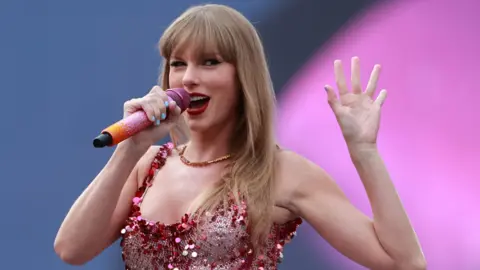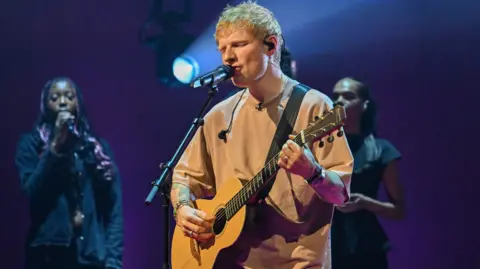All you need to know about the new ticketing laws
58 minutes agoSteven McIntoshEntertainment reporter

 PA Media
PA MediaBut within hours of the tickets going on sale, that excitement is often replaced by disappointment and complaints about the number of tickets immediately being offered for resale at extortionate prices.
However, proposed new rules due to be announced by the government on Wednesday are intended to change that by making it illegal to resell tickets for live events above their original cost.
The measures, designed to end industrial-scale ticket touting, will be arguably the most significant change to ticket-buying in the online age.
It comes a week after artists such as Sam Fender, Dua Lipa and Coldplay urged Prime Minister Sir Keir Starmer to protect fans from exploitation.
Here’s everything you need to know about the plans.
What are the new rules?
The Department for Culture, Media and Sport (DCMS) is expected to officially announce on Wednesday that:
- Ticket resale above face value will be illegal. Tickets can only be sold for their face value plus unavoidable fees including service charges
- Service charges added by resale platforms will be capped, to prevent the new price limit being undermined
- Resale platforms will have a legal duty to monitor and enforce compliance with the new price cap
- Individuals will be banned from reselling more tickets than they were entitled to buy in the initial ticket sale
- For example, if consumers were limited to purchasing four tickets each, only four can be resold
It’s not yet clear when the rules will come into effect, as the plans still have to go through the House of Commons. It’s thought the government will introduce primary legislation when Parliamentary time allows.
The new rules will not just apply to concerts but also sport, theatre, comedy and other types of live entertainment.
Why are the rules being brought in?


Ticket touting has become increasingly sophisticated in recent years.
Touts buy large numbers of tickets for the most popular events online, often with the help of automated bots.
These tickets are then relisted on secondary websites for hugely inflated prices, which many feel disappoints fans and damages the live events industry.
The new laws are intended to stamp out this practice, with the intention of improving both access and affordability for genuine fans.
The new rules would apply to any platform reselling tickets to UK fans – not just secondary ticketing websites, but also social media.
That means fans offering tickets on platforms such as X or Facebook Marketplace would be legally obliged to adhere to the rules.
Businesses that break the regulations could be subject to financial penalties of up to 10% of global turnover from the Competition and Markets Authority (CMA).
How much will fans save?
The amount of money fans will save will of course vary wildly between each show and each ticket.
Some fans might just save a few pounds, while others buying tickets for the most popular events could save hundreds or even thousands on what they would have spent on a resale platform.
Analysis conducted for the government estimates that resale tickets will be £37 cheaper on average (including fees), collectively saving fans about £112m per year.
About 900,000 more tickets will be bought directly from primary sellers each year as a result of the measures, the analysis suggests.
Typical mark-ups on secondary market tickets exceed 50%, according to the CMA, while investigations by Trading Standards have uncovered evidence of tickets being resold for up to six times their original cost.
What are the concerns about the new rules?
Some in the ticketing industry have argued that these rules will simply push ticket reselling to darker corners of the internet.
Most regulated platforms guarantee the authenticity of tickets, meaning fans get their money back if any tickets they buy turn out to be fake.
If such platforms are shut down, the secondary platforms argue, fans will actually be more exposed to fraudulent transactions and be more likely to lose their money.
Old-school physical ticket touting could make a comeback – where touts stand outside venues on the night of concerts buying and selling physical tickets for cash.
How have ticketing companies responded?

 PA Media
PA MediaA spokesman for Viagogo, one of the main secondary ticket sites, said: “We acknowledge the government’s announcement today which is part of a long, multi-year process, not a final outcome.
“Evidence shows price caps have repeatedly failed fans, in countries like Ireland and Australia fraud rates are nearly four times higher than in the UK as price caps push consumers towards unregulated sites.”
Viagogo argues the correct solution is “open distribution”, which means connecting primary platforms such as Ticketmaster with resale platforms such as Viagogo to verify tickets.
“This allows the sharing of critical information to identify illegal bot activity and eliminate fraud,” Viagogo said. “Opening the market to greater competition also helps drive prices down, benefiting fans.”
BBC News has also asked Stubhub and campaign group FairTicketing for a response to the plans.
Twickets, a resale platform championed by musicians such as Ed Sheeran, already only allows fans to sell tickets at no more than face value.
Richard Davies, founder of Twickets, described the proposals as a “landmark moment for consumer protection in live entertainment”, adding the company “fully supports the government’s plans”.
“For too long, fans have been exploited by industrial-scale touting that drives up prices, damages trust and locks genuine supporters out of the events they love,” he said.
What about dynamic pricing?

 Reuters
ReutersAnother issue that has riled live music fans in recent years is the use of so-called dynamic pricing, where ticket prices fluctuate according to demand.
It hit the headlines when Oasis’s reunion tour went on sale last year after many fans found themselves paying hundreds of pounds more than they expected.
The CMA said in September it had not found evidence that prices for Oasis tickets were actually changed in real time because of the high demand, but the backlash led the authority to secure a commitment from Ticketmaster to improve pricing information.
This includes giving fans 24 hours’ notice of tiered pricing, providing clearer price information during online queues, and ending misleading ticket labelling.
As things stand, dynamic pricing will still be allowed, but companies will have to be more open about it with fans.
Last week, the Royal Ballet and Opera announced it would introduce demand-led ticket pricing in a bid to “maximise” its revenue.
Can I still resell my ticket?
Under the proposals, consumers will still be allowed to resell their tickets if they want to, for example if they can no longer attend an event.
However, individuals will only be able to legally resell their ticket for its original cost (or less), plus any service fees.